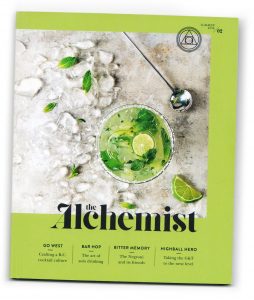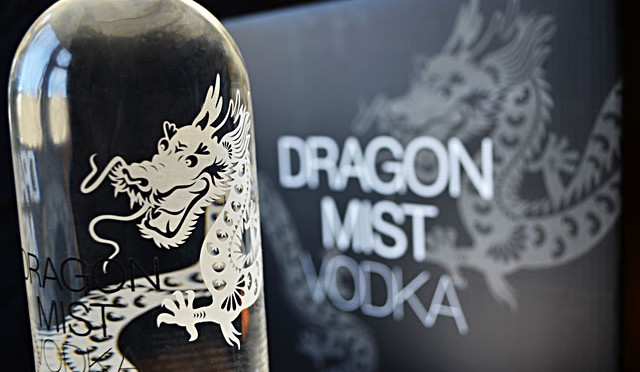Your cart is currently empty!
Alchemist: Enter the Dragon
by Alexandra Gill

As unlikely as it sounds, the infamous Chinese firewater baijiu – a pungent brew capable of bringing tears to eyes and setting throats ablaze — could be the hot new ingredient for bartenders.
Clear, potent (50 per cent – plus alcohol by volume) and often compost-pile fetid, the centuries-old spirit distilled from sorghum and other grains is also the world’s most consumed liquor.
People don’t understand. ‘Vodka?’ they ask. No. Baijiu. It has its own category.
Never heard of it? You’re not alone.
“When I bring my baijiu to the farmers’ markets, people don’t understand,” says Serry Jiang, a Surrey, BC-based craft distiller, who sells the only Canadian-made baijiu under her Dragon Mist label.
“‘Vodka?’ they ask. No. Baijiu. Like whiskey and rum, it has its own category.”
Unbeknownst to Jiang when she opened her distillery three years ago, Dragon Mist Baijiu is part of a new western invasion. Cutting-edge cocktail bars from Los Angeles (Peking Tavern) to New York (Lumos) are serving baijiu in tasting flights and shaking it into black-sesame Pina Coladas.
In London last year, the Wine & Spirit Education Trust held its first baijiu master class, and February saw nine bars participating in the city’s third annual Baijiu Cocktail Week. World Baijiu Day (Aug. 8) was launched last year by Beijing-based Canadian wine expert and blogger James Boyce, and was celebrated locally at Vancouver’s Keefer Bar.
Baijiu Basics
Baijiu is generally classified by four different aroma categories: soy sauce (Moutai is the most famous brand); rice (Vinn Baijiu a micro-distiller in Portland, makes this style); light (Dragon Mist); and strong (the cheap and nasty Erguotou).
The spirit has been featured in American Vogue, it has a new English-language paperback (Baijiu: The Essential Guide to Chinese Spirits, by U.S. writer Derek Saundhaus), and now there are a handful of lighter, lower-alcohol baijius being introduced to western markets, including the American-bottled, passion fruit-infused Byejoe.
Baijiu appears ready for its close-up. So what exactly is it?
The white spirit is grain alcohol, usually made from sorghum, but also rice, millet, corn or wheat (Dragon Mist uses the latter, grown in Dawson Creek). But it differs from western spirits in that it uses semi-solid fermentation and a one-step starter culture, jiuqu — a dry brick of mashed grains inoculated with microbial fungi (Jiang gets hers from China).
Cultural Crossroads
In 1972, Dan Rather, covering Richard Nixon’s historic state visit to China, famously termed baijiu “liquid razor blades.” Henry Kissinger later said to Deng Xiaoping, “If we drink enough Moutai, we can solve anything.”
Traditionally, the slightly moistened grains sprinkled with jiuqu are shoveled into mud ditches or buried underground in clay jars and left to ferment for days — or weeks.
“Ew!” Jiang scowls. A medical doctor by training, she says some traditions need to be modernized. Her baijiu is fermented in stainless-steel-lined cement tanks for six weeks.
The fermented mash is distilled (using steam to extract the alcohol because it doesn’t contain enough liquid to boil) and aged for at least six months — premium baijiu can take 15 years.
Dragon Mist baijiu, surprisingly clean tasting and smooth, is distilled and filtered four times, and aged for three years.
There are endless varieties of Baijiu — more than any other hard liquor; some experts say. Most westerners, however, have only ever tried Moutai, the barnyard-smelling, eye-squintingly sour baijiu of choice among Chinese government officials and business leaders. What’s more, it was likely slammed in a rapid succession of celebratory gangbei (bottoms up) shots.
“It’s very earthy and rough,” says Keefer Bar general manager Gez McAlpine, who has experimented with the infused Byejoe brands and some of the more traditional labels. “But it has a unique edge when balanced properly in cocktails.”
He says the spirit is best used with other intense flavours such as slated-plum syrup, bitter liqueurs or tea, and shaken with egg white to soften the harsher notes.
But could it ever earn a place beside tequila?
“Negative,” McAlpine laughs. “Nothing’s impossible, but that’s a stretch.”
Mind you, he hasn’t tried Dragon Mist.

